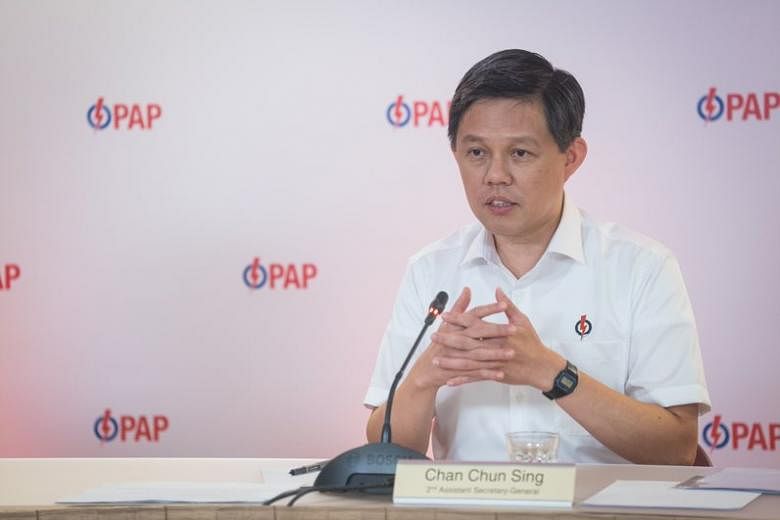SINGAPORE - Minister for Trade and Industry Chan Chun Sing on Wednesday (July 8) warned against reopening negotiations on free trade agreements (FTAs) and implementing inconsistent manpower policies.
To do so would further erode confidence in Singapore, and reduce the country's attractiveness to investors in a world where protectionism is growing, said the PAP's second assistant secretary-general.
At a People's Action Party press conference, Mr Chan noted that global investor and consumer confidence has gone down.
"What we need to do is make sure that we have a conducive environment to inspire confidence in investors to plant their investments in Singapore, to create good jobs," he said.
Over the nine-day general election campaign period, some opposition parties - notably the Progress Singapore Party - have called for Singapore to review FTAs such as the India-Singapore Comprehensive Economic Cooperation Agreement.
The PSP, led by former PAP MP Tan Cheng Bock, has also proposed introducing a quota for Employment Pass holders and lowering the quota for S Pass and work permit holders.
"At this point in time, we must be careful," Mr Chan said at the press conference. "Amidst growing protectionism, reopening FTA negotiations and inconsistent manpower policies will further erode confidence in Singapore and erode our attractiveness as a choice destination for investments."
He listed two things that Singapore has to get done within the next six to 12 months.
The first is to uphold existing bilateral and multilateral FTAs, so that Singapore can continue to access the overseas market.
"Now this is not easy. There are inherent forces that are going to bifurcate the trading relationships... the technological relationships," Mr Chan said.
His own ministry and the Ministry of Foreign Affairs will have to work to "mobilise like-minded partners" to this end.
Singapore hopes to sign the Regional Comprehensive Economic Partnership deal - the world's largest trade pact - before the end of this year. It is also pushing to make deals on as many digital economic partnership agreements as possible, which will create new opportunities for businesses, he added.
The second thing that Singapore needs to do, Mr Chan said, is demonstrate to the world that it can have "consistent and coherent long-term policies".
"We need to demonstrate to the world and distinguish ourselves as an open and connected hub, so that people will put their long-term investments into Singapore," he said.
This will allow businesses to seize new opportunities and workers to secure the new jobs that emerge, he added.
In a Facebook post on Monday, Workers' Party candidate Leon Perera pointed out that foreign direct investment grew after the 2011 General Election, even though the ruling party lost Aljunied GRC that year.
Asked for his response to this, Mr Chan said anyone looking at long-term investment trends over many years will inevitably find that it moves upwards.
"But the real question is: Is this due to the effort, or would we have gone on an even higher trajectory if not for the obstacles that we faced?" he asked.
"I think it is wrong to assume that investments will come in to Singapore, regardless of what happens in Singapore."
In the first four months of this year, the Economic Development Board (EDB) secured a total of $13 billion in investment commitments for Singapore. This is higher than the yearly amounts secured from 2013 to 2018, and exceeds the $8 billion to $10 billion initially projected fro the whole of this year. The EDB secured $15.2 billion last year.
Mr Chan pointed out that it is an "immense challenge" to attract both foreign and local investment to Singapore, and noted that local businesses are facing great uncertainty.
Investors will be looking at whether Singapore can still provide a "safe harbour", and have continuity as well as coherence in its policies, he added.
"At this point in time, the last thing we need to do is add to the uncertainty," he said.
"It is not correct to say that, regardless of what happens in this election, people will continue to have the confidence to plant their investments in Singapore."


